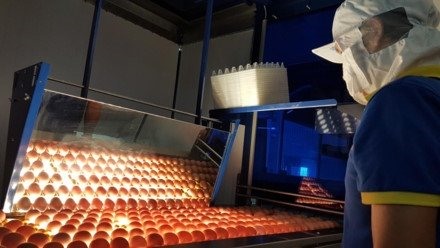
The prices of battery-farmed chickens and their egg are falling rapidly, causing concern for breeders nationwide, especially in Ha Noi and Dong Nai – the two localities raising the highest numbers of battery chickens.
The prices of battery-farmed chickens and their egg are falling rapidly, causing concern for breeders nationwide, especially in Ha Noi and Dong Nai – the two localities raising the highest numbers of battery chickens.
Pham Van Dung, a breeder raising over 30,000 battery chickens in Dong Nai Province’s Thong Nhat District, said at present a kilo of live battery-farmed chicken sells between VNĐ22,000-25,000 (96 cents – $1.1), while an egg sells at VNĐ1,000-1,100 (4.4-4.8 cents), the Lao động (Labour) newspaper reported.
 |
| The prices of battery-farmed chickens and their egg are falling rapidly, causing concern for breeders nationwide, especially in Ha Noi and Dong Nai – the two localities raising the highest numbers of battery chickens. — Photo vietnamnet.vn |
“The first thing I do every morning is calculate how much I’ve lost from my chickens,” Dung said.
Another breeder in Thong Nhat District said that at the current price he was losing about VNĐ400-500 (1.7-2.2 cents) per egg sold.
On average, he sold about 40,000 eggs daily, meaning losses of up to VNĐ16-20 million ($705-880) per day.
By selling a kilo of live battery-farmed chicken at VNĐ25,000 ($1.1), breeders made no profit, he said.
“The price is just enough to break even,” he added.
Vương Thị Minh, who buys battery chickens to sell to canteens in Hà Nội’s Mê Linh District, said she had recently been buying fewer chickens due to reduced consumption.
The slow consumption of battery chickens has been partially blamed on the campaign to ‘save pigs’ across the country, an effort to solve oversupply, according to Minh.
Another campaign coming?
The Ministry of Agricultural and Rural Development estimated that the country has tens of millions of battery chickens.
The number raises the question of whether people will have to ‘save’ chickens once the campaign to save pigs has ended.
In response, Nguyễn Thanh Sơn, head of the ministry’s National Institute of Animal Sciences, said the rearing of chickens had grown rapidly in recent years.
Data from the agricultural ministry estimated the number of chickens in Việt Nam at 217 million, an increase of nearly 5 per cent compared to last year.
Sơn said that even last years’ number was 9.9 per cent higher than in 2015.
"This results in a situation of oversupply and a subsequent drop in prices," he added.
Nguyễn Kim Đoán, deputy head of Đồng Nai Livestock Association said the process to raise battery chickens often lasts between 42-60 days, therefore, breeders could stop hatching chickens to fix the situation.
“It means we do not need a campaign to save battery chickens,” he said.
However, Đoán advised breeders to think carefully before raising chickens or other animals, to avoid flooding the market further and putting more pressure on prices, he added.
(Source:VNS)



